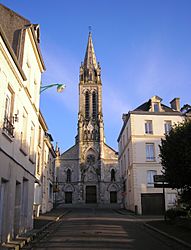Caumont-sur-Aure facts for kids
Quick facts for kids
Caumont-sur-Aure
|
|
|---|---|

The church in Caumont-sur-Aure
|
|
| Country | France |
| Region | Normandy |
| Department | Calvados |
| Arrondissement | Vire |
| Canton | Aunay-sur-Odon |
| Intercommunality | Pré-Bocage Intercom |
| Area
1
|
39.93 km2 (15.42 sq mi) |
| Population
(2017)
|
2,368 |
| • Density | 59.304/km2 (153.60/sq mi) |
| Time zone | UTC+01:00 (CET) |
| • Summer (DST) | UTC+02:00 (CEST) |
| INSEE/Postal code |
14143 /14240
|
| Elevation | 80–247 m (262–810 ft) |
| 1 French Land Register data, which excludes lakes, ponds, glaciers > 1 km2 (0.386 sq mi or 247 acres) and river estuaries. | |
Caumont-sur-Aure is a small town, also known as a commune, located in France. It is found in the region called Normandy, which is in the Calvados department. This area is in the northwest part of France.
The town of Caumont-sur-Aure was officially created on January 1, 2017. It was formed by combining three smaller towns: Caumont-l'Éventé (which is now the main part of Caumont-sur-Aure), Livry, and La Vacquerie.
Contents
What is a Commune?
Understanding French Local Government
In France, a commune is the smallest type of local government area. Think of it like a city, town, or village. Each commune has its own mayor and a local council. These leaders help manage the daily life of the people living there.
How Communes Work
Communes are important for many things. They handle local services like schools, roads, and public spaces. They also keep official records, like birth and death certificates. The mayor is the main leader of the commune. They make sure local laws are followed and represent the town.
Geography of Caumont-sur-Aure
Where is Caumont-sur-Aure Located?
Caumont-sur-Aure is in the Calvados department. This department is part of the Normandy region. Normandy is famous for its green landscapes and rich history. The town is situated in an area known as the Bocage Normand. This means it has a mix of woodlands, fields, and small hills.
Natural Features and Landscape
The town's name, Caumont-sur-Aure, tells us something about its location. "Sur-Aure" means "on the Aure," referring to the Aure River. This river flows through the area, adding to its natural beauty. The landscape around Caumont-sur-Aure is typical of rural Normandy, with farms and small forests.
History of the Area
The Formation of Caumont-sur-Aure
Before 2017, Caumont-sur-Aure did not exist as a single commune. Instead, there were three separate communes: Caumont-l'Éventé, Livry, and La Vacquerie. These towns decided to join together to form a new, larger commune. This often happens in France to help towns share resources and manage services more efficiently.
Historical Significance of the Former Communes
Each of the former communes has its own history. Caumont-l'Éventé, for example, has been a local center for a long time. It has a church that shows its long past. Combining these towns helps preserve their individual histories while creating a stronger community for the future.
Life in Caumont-sur-Aure
Population and Community
Caumont-sur-Aure has a population of around 2,368 people, based on 2017 numbers. This makes it a medium-sized commune. The people living here form a close-knit community. They often participate in local events and activities.
Local Economy and Activities
The economy of Caumont-sur-Aure is mainly based on farming and local businesses. Many people work in agriculture, growing crops or raising animals. There are also small shops and services that cater to the needs of the residents. The town provides a quiet, rural lifestyle.
Government and Administration
How Caumont-sur-Aure is Governed
Like all French communes, Caumont-sur-Aure is governed by a mayor and a municipal council. The current mayor is Christophe Le Boulanger. He was elected to lead the town from 2017 to 2020. The mayor and council work together to make decisions for the community.
Intercommunality and Cooperation
Caumont-sur-Aure is part of a larger group called "Pré-Bocage Intercom." This is an example of "intercommunality." It means that several communes work together on bigger projects. These projects might include waste management, economic development, or tourism. This cooperation helps smaller towns achieve more than they could alone.
See also
 In Spanish: Caumont-sur-Aure para niños
In Spanish: Caumont-sur-Aure para niños
 | Delilah Pierce |
 | Gordon Parks |
 | Augusta Savage |
 | Charles Ethan Porter |



